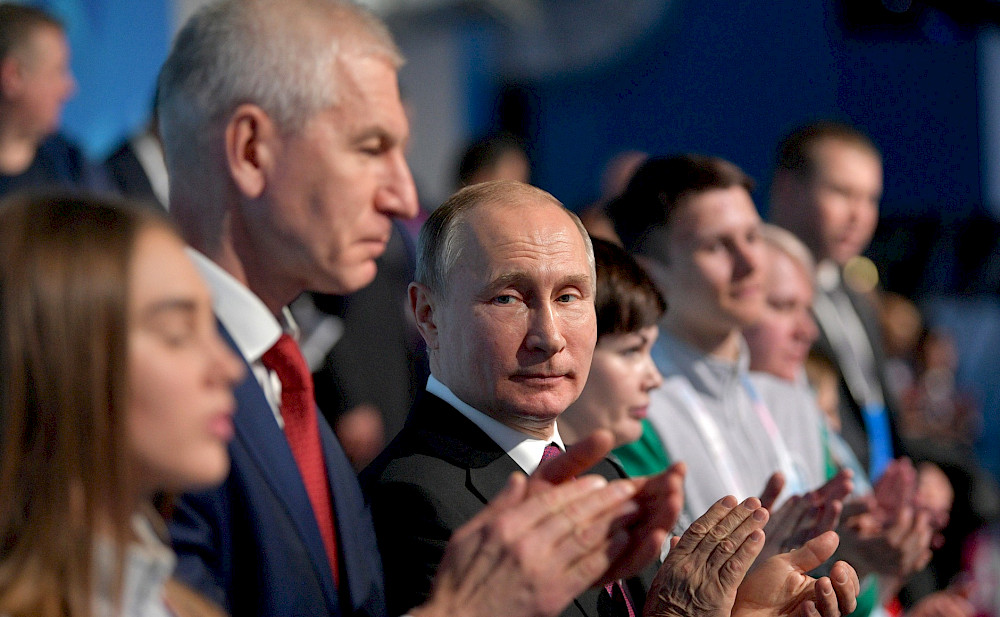How did Putin gain control over university sports?
Power in FISU, umbrella organisation of university sports, transferred to Putin in the 2010s. But how did it come to this? The Finnish Student Sports Federation’s events and training specialist Markku Rantahalvari will answer this question in the OLL blog.

The International University Sports Federation (or FISU, after its French name Fédération internationale du sport universitaire) was politically equal by the turn of the millennium: no single country had control over another. However, during the 2010s, the situation changed, with FISU becoming increasingly under the thumb of Vladimir Putin. How did it come to this?
Organising the World University Games brings influence
By 2004 or 2005 at the latest, Russia decided to begin controlling university sports as it was preparing its bid for the 2011 World University Games. Around the same time, Russian officials were preparing the country’s bid for the 2014 Winter Olympics in Sochi. Russia was unsuccessful in its bid for the 2011 World University Games, but was chosen to host the 2013 games.
The World University Games are among the biggest sporting events in the world in terms of the number of athletes, although not in the same league when it comes to spectator numbers. Russia has been keen to host these events, and pours huge amounts of money into them. But the regime is not doing this out of benevolence.
The World University Games in the summer of 2013 in Kazan cost four billion euros; the 2019 winter games in Krasnoyarsk one billion; and the preliminary budget for the summer event in Yekaterinburg in 2023 was six billion. However, the Yekaterinburg games were cancelled because of the war in Ukraine.
In order to understand the scale of the budgets for the World University Games hosted by Russia, it is worthwhile comparing them to the Olympic Games. For example, the Turin Winter Olympics in 2006 cost less than 600 million euros, and the Rio de Janeiro Summer Olympics 11 billion euros. By means of tourism, jobs created and TV rights, the Olympic Games can offset some or even all of its expenses. This is not the case with the World University Games.
Russia got to host the World University Games by gaining influence in FISU and by silencing critics.
The World University Games were previously a way for a country to prove to the International Olympic Committee (IOC) that it had what it took to hold the Olympic Games. Russia had already landed a successful bid for the Sochi Winter Olympics before hosting the Kazan World University Games, so hosting the World University Games had no effect on that. However, Russia did get to host the World University Games by gaining influence in FISU, and managed to silence dissent.
Russia has also been keen to organise World University Games, especially when no other country has expressed an interest. In such cases, it’s difficult to criticise a country that comes to the rescue.
Putin’s underling in FISU
Oleg Matytsin is serving his second term as president of FISU. However, he has not been the acting president since sanctions were imposed on Russia for its national doping programme in spring 2021. The sanctions will be lifted at the end of this year. In theory, Matytsin could serve his term as President to the end, but in practice the war in Ukraine should prevent that – ‘should’ being the operative word.
International recognition of Minister of Sports and having trusted man of Putin as the President increase Russian influence in FISU.
Matytsin’s role in the top position of international university sports is made all the more questionable by the fact that he has been Russia’s Minister of Sports since 2020. It would have been natural for him to step aside after such a notable appointment, but he didn’t. International recognition of Minister of Sports and having trusted man of Putin as the President increase Russian influence in FISU.
Putin keeping busy
Major world leaders do not usually find the time in their calendars for university sports, but Vladimir Putin is an exception. Putin acts as the patron of World University Games, opens the games and makes the occasional visit to hand out medals. Before the games, he also personally inspects preparations and conducts public video conferences with the organisers, giving instructions.
It is also important to get distinguished visitors to the games from around the world. Among these have been President of the International Ice Hockey Federation Rene Fasel and other highly influential figures in sports.
To solidify Matytsin’s power, Putin held an opening speech at the FISU World Conference in 2019, in which Matytsin was re-elected for a second term. In 2014, Putin invited Matytsin’s predecessor, Claude-Louis Gallien for a meeting, awarding him the Order of Friendship. FISU Secretary General-CEO Eric Saintrond also received this honour, in 2021. Distinctions of this kind were unprecedented in university sports.
A hand-picked board for full obedience
The FISU board consists of 15 members and presiding officers. By the most recent election, in 2019, Russia’s influence had grown to the point that they could influence the selection of persons for all positions of trust in FISU.
There is plenty of interest in the management and operation of the International Olympic Committee, while the US and other Western countries are less interested in university sports and the politics involved.
The coalition led by Russia was able to prevent candidates they did not prefer from being elected. This situation is easier to attain in university sports than in general sports, because interest in university sports varies from country to country. For example, there is plenty of interest in the management and operation of the International Olympic Committee, while the US and other Western countries are less interested in university sports and the politics involved.
Influencing the board is also reflected in the FISU’s composition: The FISU Headquarters in Lausanne is the workplace of more and more Russians. This is a fact worth knowing if you want to achieve complete power within an organisation.
Why are Putin and Russia going to so much trouble about university sports? More about that in my next blog.
You may also be interested in
-
President of the Finnish Student Sports Federation: The Finland on the Move programme not properly implemented for students
Published:Emilia Junnila, President of the Finnish Student Sports Federation, sees potential in the Finland on the Move programme included in the Government Programme to make students more active. However, she is concerned about cuts affecting students, which can scupper any good intentions.
-
Final episode of the election podcast
Published:In the final episode of our election podcast we got to interview Silja Borgarsdóttir Sandelin (Swedish People's Party of Finland), Sari Essayah (Christian Democrats of Finland) and Karoliina Kähönen (Movement Now). What do they think about investing in measures to prevent the deterioration of well-being, in order to avoid a crisis in social and health care?
Read more about article: Final episode of the election podcast
-
Election panel held by the Finnish Student Sports Federation and the Finnish Olympic Committee will focus on questions concerning university sports and student sports
Published:The Finnish Student Sports Federation (OLL) and the Olympic Committee will organize a parliamentary election panel on Monday, March 13, from 2 pm. to 3:30 pm. at the Olympic Stadium. The election panel will focus on questions concerning university sports and student sports.
Share this page
Page last updated 28.11.2022
